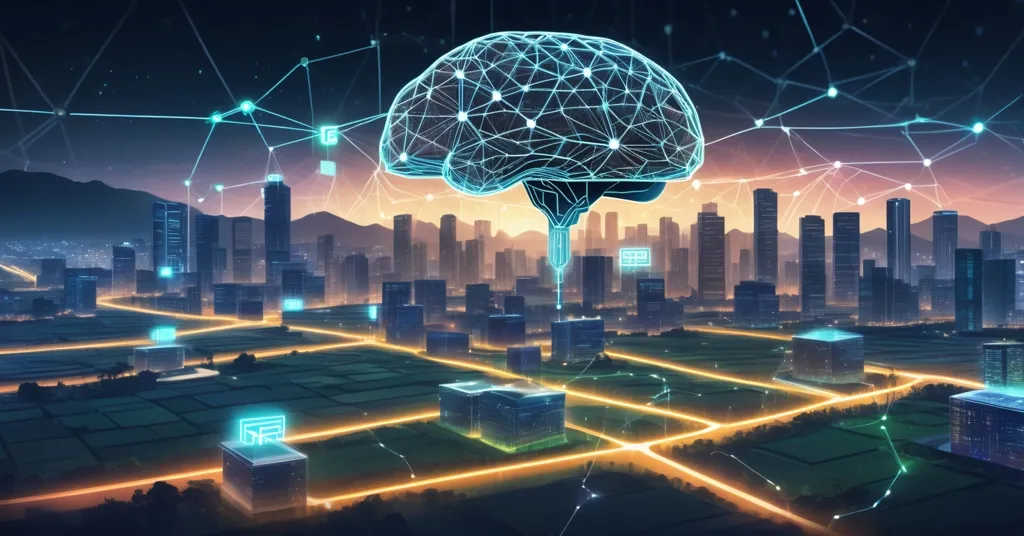Philippine Businesses Struggle with AI Adoption: Can Blockchain Save the Day?

Philippine Businesses Lag in AI Adoption: Blockchain Could Be the Game-Changer
Philippine businesses are hitting the snooze button on artificial intelligence (AI), a technology reshaping industries worldwide, as revealed by a recent study from the Philippine Institute for Development Studies (PIDS). With barriers like shaky infrastructure and a crippling skills gap stunting growth, there’s a silver lining: blockchain technology could provide the trust and security needed to kickstart AI adoption in a meaningful way.
- AI Adoption Struggles: Only 3.02% of industries adopted AI in 2021, with just 14.9% of firms using AI or machine learning tools.
- Urban-Rural Gap: Urban areas like the National Capital Region lead with 25.4% adoption, while rural regions like BARMM are virtually offline.
- Blockchain’s Edge: Enterprise blockchain can secure AI data integrity, addressing trust issues and potentially speeding up adoption.
The Harsh Reality of AI Adoption in the Philippines
The PIDS study doesn’t mince words: despite 90.8% of Philippine businesses having computers and 81% connected to the internet, the embrace of advanced technologies like AI remains embarrassingly low. A scant 21.7% of firms have a website, and only 31.2% engage in e-commerce. When it comes to AI, the figures are downright bleak—just a 3.02% adoption rate across all industries in 2021. Geographically, urban powerhouses like the National Capital Region (NCR) show a respectable 25.4% adoption rate, while rural areas such as the Bangsamoro Autonomous Region in Muslim Mindanao (BARMM) are effectively shut out of the digital revolution. Sector breakdowns tell a similar story of disparity: Business Process Outsourcing (BPO) leads with a modest 7.19% adoption, Information and Communication Technology (ICT) follows at 5.94%, and agriculture—a vital economic pillar—crawls along at a measly 1.55%. For more insights on this slow progress, check out the findings on AI adoption challenges in Philippine industries.
So, what’s gumming up the works? The obstacles are as frustrating as they are familiar in emerging markets. Digital infrastructure is often unreliable—think spotty internet and outdated systems that can’t support modern tech. Awareness is a massive issue; only 1 in 5 firms even understand what AI could do for their bottom line. The skills gap is glaring, with PIDS scoring the Quality of Engineering and Technology Higher Education at a flat 0.00, meaning there’s practically no local talent equipped to implement or maintain AI systems. Funding is another sore spot, with Venture Capital Availability limping in at a score of 6.00. In the 2023 Asia-Pacific AI Readiness Index, the Philippines ranks rock bottom—12th out of 12—with a score of 35.7 out of 100, and 10th in business readiness at a pitiful 25.4. As PIDS starkly notes:
“In the Philippines, the integration of AI into business and industry is still in its nascent stages, with the country ranking below average in AI readiness compared to other Asia-Pacific nations.”
Pockets of Promise: Where AI Is Making Waves
Amid the gloom, there are sparks of success that hint at AI’s transformative potential. UnionBank, a major player in Philippine finance, has used AI-driven systems for credit scoring to boost fraud detection by 19% and double loan approval rates—a critical win for financial inclusion in a country where access to credit remains a hurdle. E-commerce giant Lazada reveals that 88% of its Filipino customers rely on AI recommendations for purchases, proving that local consumers are more than ready for smart tech. In telecommunications, PLDT’s AI-powered voice assistant, Talkbot Pro, has slashed call handling times from 6 to 3 minutes, streamlining customer service. Utilities like Maynilad are leveraging AI in their Non-Revenue Water Management Program—a system to track and reduce water loss from leaks or theft—while manufacturers such as Mitsubishi Motors Philippine Corporation use IBM’s watsonx.ai (a platform for AI-driven business insights) to enhance operational efficiency. These standout cases show what’s possible, but they’re outliers in a landscape bogged down by systemic challenges.
Government Plans and Glaring Gaps
The Philippine government isn’t blind to AI’s potential. Through the Department of Trade and Industry (DTI), the National AI Strategy Roadmap seeks to position the country as a Southeast Asian AI hub, projecting a staggering 12% GDP boost—approximately $92 billion—by 2030 if adoption scales. The roadmap emphasizes public-private partnerships and infrastructure investments, though concrete details on funding and timelines remain frustratingly vague. The government earns top marks (100.00) for Vision and Data Protection laws, showcasing a commitment to privacy safeguards. However, there’s a massive red flag: ethical guidelines for AI development score a shocking 0.00. As PIDS warns:
“The absence of Ethical Principles (0.00) for AI indicates a gap in guidelines necessary for responsible AI development.”
This ethical void isn’t just bureaucratic nitpicking—it’s a direct threat to public trust. Without clear rules, AI could easily be misused for biased decision-making or invasive surveillance, especially in a nation with a spotty track record on regulatory enforcement. For businesses already wary of tech investments, and citizens cautious of data abuse, this gap could stall AI adoption before it even gains traction.
Blockchain’s Role: Securing AI with Decentralized Trust
Here’s where blockchain—the tech underpinning Bitcoin and other cryptocurrencies—steps in as a potential lifeline. At its simplest, blockchain is a decentralized, tamper-proof ledger that records data using cryptographic security, ensuring it can’t be altered or faked. For AI, which thrives on massive datasets to train algorithms, this offers a way to guarantee data integrity and ownership. Picture an AI system helping a rural Filipino farmer predict crop yields based on weather and soil data; if that data is secured on a blockchain, every input is verifiable and unchangeable, eliminating the risk of manipulation by dodgy intermediaries or corrupt systems.
More critically, blockchain tackles AI’s trust deficit. In a country where only 1 in 5 businesses are aware of AI, skepticism is a huge barrier. Enterprise blockchain systems—often private or permissioned versions of the tech tailored for corporate use—can act as a credibility booster, proving that AI decisions aren’t mysterious black-box outputs but are based on reliable, auditable data. Globally, platforms like Ethereum are already experimenting with decentralized AI training and data marketplaces via smart contracts (self-executing code on the blockchain that automates agreements without middlemen). Projects like SingularityNET are pushing boundaries by enabling AI services to run on decentralized networks. While Bitcoin itself isn’t designed for such complex tasks, its core principle of eliminating centralized control resonates deeply with this vision of trustless tech.
Playing Devil’s Advocate: Is Blockchain-AI Integration Overblown?
Let’s pump the brakes for a second and question the hype. Blockchain isn’t a magic fix for AI’s woes, especially in a developing market like the Philippines. The technology is notoriously resource-hungry, requiring significant energy and hardware—resources that rural areas often lack. Scalability remains a sticking point; public blockchains like Ethereum can be slow and expensive for mass transactions, making them impractical for real-time AI applications. Cost is another killer—small and medium-sized enterprises (MSMEs), which dominate the Philippine economy, are already cash-strapped and unlikely to invest in unproven tech without quick returns. Then there’s the regulatory mess: with the government’s ethical blind spot on AI, blockchain could face similar legal ambiguity, either stifling innovation or opening doors to exploitation.
Yet, these challenges don’t erase blockchain’s promise—they highlight the need for pragmatic solutions. Hybrid models combining private blockchains for sensitive AI data with public ones for transparency could strike a balance. The philosophy of effective accelerationism (e/acc)—pushing tech progress at breakneck speed to dismantle broken systems—urges us to forge ahead despite the messiness, especially to level the playing field for rural and underserved communities.
Why Bitcoin Maximalists Should Give a Damn
For hardcore Bitcoin maximalists, this detour into AI and blockchain might feel like a sideshow from the sacred mission of BTC as the ultimate hard money. Fair point—Bitcoin’s purpose is to be a decentralized store of value, not a sandbox for AI experiments. But let’s not miss the forest for the trees. The broader fight for decentralization, privacy, and freedom from centralized gatekeepers applies just as much to data as it does to money. Blockchain’s potential to secure AI systems mirrors Bitcoin’s rebellion against trust-based financial systems. If we’re truly committed to disrupting the status quo, supporting tech synergies that protect individual sovereignty—whether it’s through peer-to-peer transactions or tamper-proof data ledgers—should be second nature.
Regional Race: Philippines Falling Behind
Stack the Philippines up against its Southeast Asian neighbors, and the lag becomes painfully clear. Singapore, the region’s tech poster child, boasts AI adoption rates exceeding 50% in key industries, fueled by top-tier infrastructure and aggressive government support. Malaysia, while less advanced, is making inroads with AI in agriculture at around 10% adoption—still leaps ahead of the Philippines’ 1.55%. On the blockchain front, both countries are testing central bank digital currencies (CBDCs) and decentralized finance (DeFi) initiatives, while the Philippines is still hashing out basic crypto rules. This isn’t just a minor gap—it’s a competitive crisis. Without rapid progress on AI and blockchain integration, the country risks becoming a tech backwater in a region racing toward digital dominance.
Key Questions and Takeaways on AI, Blockchain, and Crypto
- What’s blocking Philippine businesses from adopting AI?
A brutal mix of unreliable digital infrastructure, low awareness (only 1 in 5 firms know about AI), nonexistent tech education (scoring 0.00), and scarce funding (Venture Capital Availability at 6.00) keeps progress at a standstill. - Why is there such a wide urban-rural divide in AI adoption?
Urban hubs like NCR have the resources and talent for a 25.4% adoption rate, while rural zones like BARMM lack basic connectivity and education, leaving them digitally stranded. - How can blockchain enhance trust in AI systems for Filipinos?
Blockchain secures data with immutable, transparent records, ensuring AI inputs and outputs are verifiable, which helps ease privacy concerns and ethical risks in a low-trust environment. - Why should crypto fans care about AI-blockchain integration?
It extends decentralization’s core mission—protecting data with the same ferocity Bitcoin protects value, ensuring tech empowers individuals rather than centralized overlords. - Is the Philippine government doing enough to drive AI forward?
Bold plans like the National AI Roadmap and strong data protection laws are promising, but a total lack of ethical guidelines (0.00 score) threatens to undermine trust and stall adoption.
Final Thoughts: Seizing the Decentralized Future
The Philippines is at a critical juncture. AI holds the power to supercharge its economy, but only if the digital divide is bridged and ethical pitfalls are addressed. For those of us in the crypto space, this is more than a tech trend—it’s a frontline in the battle for decentralization. Blockchain isn’t just for Bitcoin or altcoins; it’s a weapon to ensure the next wave of innovation doesn’t morph into another tool for centralized control. If we don’t advocate for solutions like AI on secure, tamper-proof ledgers now, we’re handing the keys to the very systems crypto was born to tear down. The time to act is now—let’s build a future that’s truly ours.



